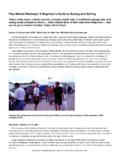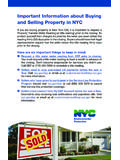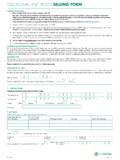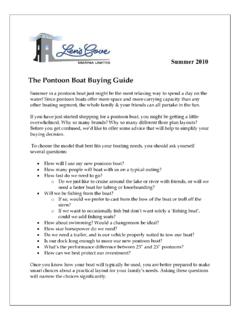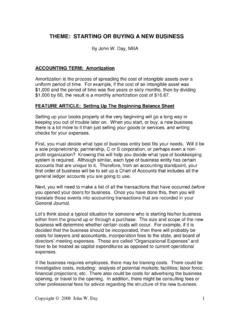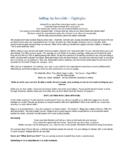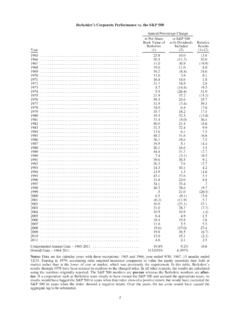Transcription of 100 Questions & Answers About Buying A New Home
1 100 Questions & Answers About Buying A New Home Dear Future Homeowner: Homeownership is becoming a reality for more and more Americans. During 2000, the US homeownership rate reached , the highest rate ever. Yet many Americans don't realize that homeownership is within their grasp. A home is a financial asset and more: it's a place to live and raise children; it's a plan for the future; it's an investment in your community. That's why we at the Department of Housing and Urban Development want all Americans to have an opportunity to enjoy the benefits of owning a home.
2 And we are especially proud of our work to help first time homebuyers: thanks to our special programs, more than 81% of FHA insured loans went to first time homebuyers during 2000. Knowledge is said to open doors. This is literally true when it comes to Buying a home. To become a first time homebuyer, you need to know where and how to begin the homebuying process. The following Questions and Answers have been carefully selected to give you a foundation of basic knowledge. In addition to helping you begin, this brochure will give you the tools necessary to navigate the entire process from deciding whether you're ready to buy, all the way to that final proud step, getting the keys to your new home.
3 Calling for this brochure was your first step. Now you can use this information to determine if you're ready to buy a home. if you are ready, contact a real estate agent, lender, or a housing counseling agency. They can help you decide your next step. HUD's FHA has helped more than 30 million people become homeowners since 1934. We want to help you open the door to your own home. After all, HUD and FHA are on your side. Good Luck! TABLE OF CONTENTS Introduction Part I Getting Started Part II Finding your Home Part III You've Found It Part IV General Financing Questions :The Basics Part V First Steps Part VI Finding The Right Loan For You Part VII Closing Part VIII How Can HUD And The FHA help Me Become a Homeowner Part IX Mortgage Insurance Part X FHA Products Glossary GETTING STARTED 1.
4 HOW DO I KNOW IF I'M READY TO BUY A HOME? You can find out by asking yourself some Questions : Do I have a steady source of income (usually a job)? Have I been employed on a regular basis for the last 2 3 years? Is my current income reliable? Do I have a good record of paying my bills? Do I have few outstanding long term debts, like car payments? Do I have money saved for a down payment? Do I have the ability to pay a mortgage every month, plus additional costs? If you can answer "yes" to these Questions , you are probably ready to buy your own home.
5 2. HOW DO I BEGIN THE PROCESS OF Buying A HOME? Start by thinking About your situation. Are you ready to buy a home? How much can you afford in a monthly mortgage payment (see question 4 for help)? How much space do you need? What areas of town do you like? After you answer these Questions , make a "To Do" list and start doing casual research. Talk to friends and family, drive through neighborhoods, and look in the "Homes" section of the newspaper. 3. HOW DOES PURCHASING A HOME COMPARE WITH RENTING? The two don't really compare at all.
6 The one advantage of renting is being generally free of most maintenance responsibilities. But by renting, you lose the chance to build equity, take advantage of tax benefits, and protect yourself against rent increases. Also, you may not be free to decorate without permission and may be at the mercy of the landlord for housing. Owning a home has many benefits. When you make a mortgage payment, you are building equity. And that's an investment. Owning a home also qualifies you for tax breaks that assist you in dealing with your new financial responsibilities like insurance, real estate taxes, and upkeep which can be substantial.
7 But given the freedom, stability, and security of owning your own home, they are worth it. 4. HOW DOES THE LENDER DECIDE THE MAXIMUM LOAN AMOUNT THAT CAN AFFORD? The lender considers your debt to income ratio, which is a comparison of your gross (pre tax) income to housing and non housing expenses. Non housing expenses include such long term debts as car or student loan payments, alimony, or child support. According to the FHA,monthly mortgage payments should be no more than 29% of gross income, while the mortgage payment, combined with non housing expenses, 4 should total no more than 41% of income.
8 The lender also considers cash available for down payment and closing costs, credit history, etc. when determining your maximum loan amount. 5. HOW DO I SELECT THE RIGHT REAL ESTATE AGENT? Start by asking family and friends if they can recommend an agent. Compile a list of several agents and talk to each before choosing one. Look for an agent who listens well and understands your needs, and whose judgment you trust. The ideal agent knows the local area well and has resources and contacts to help you in your search. Overall, you want to choose an agent that makes you feel comfortable and can provide all the knowledge and services you need.
9 6. HOW CAN I DETERMINE MY HOUSING NEEDS BEFORE I BEGIN THE SEARCH? your home should fit way you live, with spaces and features that appeal to the whole family. Before you begin looking at homes, make a list of your priorities things like location and size. Should the house be close to certain schools? your job? to public transportation? How large should the house be? What type of lot do you prefer? What kinds of amenities are you looking for? Establish a set of minimum requirements and a 'wish list." Minimum requirements are things that a house must have for you to consider it, while a "wish list" covers things that you'd like to have but aren't essential.
10 FINDING your HOME 7. WHAT SHOULD I LOOK FOR WHEN DECIDING ON A COMMUNITY? Select a community that will allow you to best live your daily life. Many people choose communities based on schools. Do you want access to shopping and public transportation? Is access to local facilities like libraries and museums important to you? Or do you prefer the peace and quiet of a rural community? When you find places that you like, talk to people that live there. They know the most About the area and will be your future neighbors. More than anything, you want a neighborhood where you feel comfortable in.
